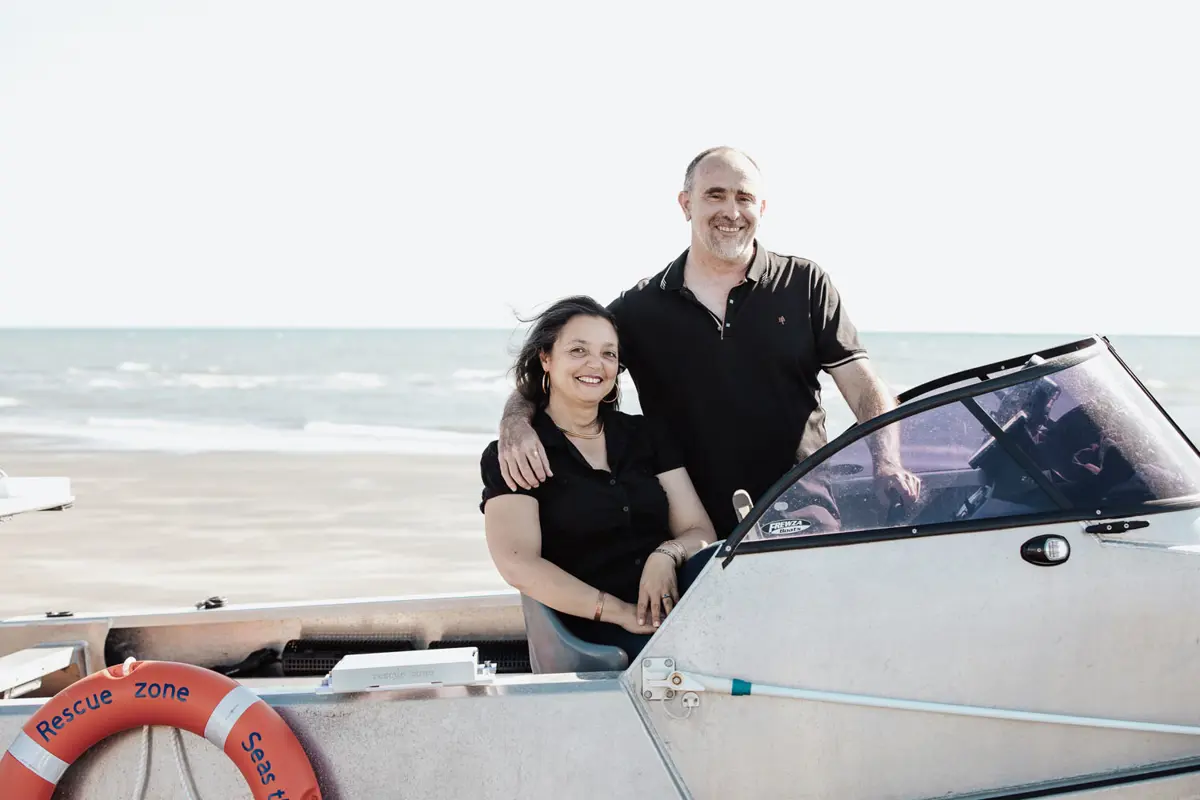Kāpiti Tech Powering Global Marine Safety
Inspired by a real-life breakdown at sea, tech entrepreneur Jerome Daste developed Rescue Zone, an all-in-one marine safety app now used worldwide. Built in Kāpiti, it provides instant access to emergency services, distress signals, and community support. With global partnerships and new innovations, Rescue Zone is revolutionising coastal navigation and safety.
When Kāpiti Coast tech entrepreneur Jerome Daste found himself broken down at sea half a decade ago, it sparked an idea to create an app to enhance marine safety in Aotearoa.
As the French-born software developer waited on hold with the Coastguard, he wondered how many boaties were nearby but unable to see him. If he could contact them, Jerome decided, or reach emergency services faster, there'd be less risk of getting into further trouble.
"When I moved to New Zealand from the UK in 2011, I'd never lived close to a beach, but I'd sailed in the UK and learnt game fishing with my father-in-law in Wallis, a French island north of Fiji. Immediately, I decided I wanted a boat, so I did the Kiwi thing and bought a used one, which I loved!" recalls Jerome, co-founder of Rescue Zone, a global all-in-one boating app for safe coastal navigation, developed on the Kāpiti Coast.
"But the motor was a bit old, and I broke down just out of Paraparaumu Beach. I had a VHF and phone with me, but I knew not everyone has a VHF onboard or uses it. In New Zealand, the weather changes very quickly and even if you're close enough to the coast to swim, depending on the current, you're already in trouble. If you don't plan for your anchor and enough rope, it can get worse very quickly."
As the father of two waited to be assisted, Jerome realised he had all the software development frameworks to create an app tailored specifically for the marine community.
He'd worked on various mobile technology projects in the past, including a microservices app named Nowsnapp, which he also co-launched from Kāpiti in 2019.
With the added benefits of having his own boat and already employing three developers in a Paraparaumu office, Jerome discussed the concept with his business partner Laurent Guillon, who is based in France.
Within months, they were creating Rescue Zone.
Today, with emergency numbers being geolocated, the app offers instant access to maritime rescue coordination centres wherever you are in the world. It uses distress signals Mayday, for instant emergency assistance, and Pan-Pan for non-life-threatening emergencies.
Equipped with GPS location, offline mode, and a fishing spot locator, the app features a logbook for inputting journey and vessel details.
Furthermore, a Community Help function connects users to fellow boaties to assist with the likes of a jumpstart, or – in true Kiwi style – to pass on unused bait.

"To finance Rescue Zone, Laurent and I created another version of Nowsnapp for a French client Crosscall, who are a world leader in rugged phones for extreme sports," explains Jerome, who has degrees in International Business and Software Development.
"We created the cloud for Crosscall and a type of marketplace, where notifications can be received by hundreds of thousands of users."
As well as being supported by his wife Josile, who helps with business development for Rescue Zone, Jerome collaborated with local consultant Eric Holliday from FISH Safety Foundation. Together, they brought in the help of Kāpiti Police.
“The official launch was in France in April 2023, with Generali Insurance as partners under an exploitation license. It was also a major milestone as it was the first time Rescue Zone could generate a substantial income," Jerome says.
"Rescue Zone was first tested at sea with emergency services five months earlier, ahead of a racing specific version we used for the Olympics Test Events in July 2023, an Olympic sailing qualifier in Marseilles."
Although the app was straight out of the development phase, it was already accredited as a valid marine safety tool by the French government.
"A prototype system to guarantee safety and security was used by 40 officials, mostly Maritime Police, during the Olympic sailing qualifier races," he says.
"In September 2024, Rescue Zone was also approved by Wallis Lagoon Safety, a small local rescue organisation in Wallis, which estimated the app could save 20 minutes per operation."
Jerome is also part of Kāpiti Coast District Council's Tech Pilot and Tech Cluster, which assisted with training and networking, including introducing him to Levin based company Air Vision Systems.
Now, they are collaborating to create Rescue Zone Starlink brackets, which will protect the antenna for high-speed internet connectivity at sea beyond 4G.
"In the Tech Cluster, we're all motivated people with ambitious tech, and with Kāpiti being a small place, we needed help. There's a strong commitment towards establishing an eventual Kāpiti Tech Hub, which looks fruitful."
Since one out of 10 Kiwis own a boat, Jerome hopes to see Rescue Zone utilised to complement and enhance the efforts of emergency response services across New Zealand.
"We want to reduce the number of preventable accidents and fatalities on lakes and seas, while increasing community among boaters," he concludes. "Our goal is to have this safety tool in everyone's pocket."
